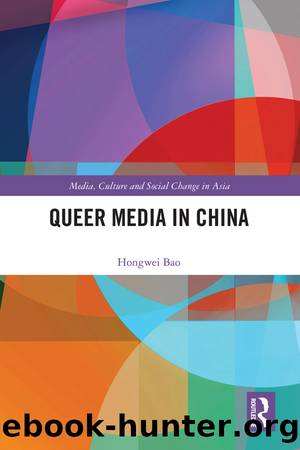Queer Media in China by Hongwei Bao

Author:Hongwei Bao [Bao, Hongwei]
Language: eng
Format: epub
Tags: Social Science, Research, Regional Studies
ISBN: 9780429340376
Google: R943zgEACAAJ
Barnesnoble:
Goodreads: 56356598
Publisher: Routledge
Published: 2021-01-15T02:19:08+00:00
Catachresis is not about an incorrect use of words as if there were a correct use as such. The radicality of the concept lies in the understanding that words do not have fixed meanings and there is no originality; rather, meanings are constantly generated in the process of words being used in various historical and social contexts. Catachresis is therefore an opportunity, âinsomuch as in losing the sense proper to a sign [it] exposes a reconfigured relation to that signâ (Hawthorne and van Klinken 2013: 159). This âreconfigured relationâ â sometimes referred to as cultural translation â has a significant impact on the study of culture.
The term catachresis has been used by postcolonial studies scholars including Gayatri Spivak (1988b) and Homi Bhabha (2004) to articulate postcolonial positions and to challenge the often taken-for-granted Eurocentrism in the process of cultural translation. Spivak applies catachresis to the âmaster wordsâ that claim to represent a social group such as âwomanâ or âproletarianâ. Such words are often imposed upon a group of people through particular power configurations and to serve specific ideological agendas. The use of the term catachresis, for Spivak, aims at âreversing, displacing, and seizing the apparatus of value-codingâ (1988b: 228) in the context of colonialism and its aftermath.
Following Spivakâs postcolonial critique, Tani Barlow (2004) traces the genealogy of women in Chinese feminist thoughts in the twentieth century. Seen from the perspective of âfuture anteriorityâ, the female subject is rather fragmentary and contingent in various periods of modern Chinese history. Terms such as funü, nüxing, and nüren are not merely different linguistic markers; they also denote distinct female subjectivities produced by various configurations of power at specific times. These terms can be seen as catachresis, insofar as they reveal the incompleteness and inadequacy of the sign âwomanâ and the violent process of social modernisation and engineering. Catachresis of the word âwomanâ can be situated in Chinaâs âtranslated modernityâ (Liu 1994), which is at the same time a âcolonial modernityâ (Barlow 1997), in which knowledge production on gender has been intertwined with the histories of colonialism, nationalism, socialism, and capitalism.
This chapter marks an effort to conceptualise cultural translation in terms of catachresis in the context of contemporary China. Locating the Chinese queer subject in the globalisation of sexualities and identities, this chapter examines the production of the queer subject in public culture and social movements. In popular discourses, queer is often imagined as a coherent subject, legitimised by the âauthenticâ narratives produced by sexual minorities themselves in transnational queer activism. Similarly, the Chinese queer subject is often seen as a derivative from â if not an outcome of â the global queer discourse. The self-assumed coherence of the Chinese queer subject â together with the âoriginalityâ and âauthenticityâ of the global queer subject â requires critical interrogation. My approach in this chapter is to focus on the BJQFF, a queer public event that has shaped Chinese queer identities and communities in the past 20 years, by using catachresis as a critical lens. Through
Download
This site does not store any files on its server. We only index and link to content provided by other sites. Please contact the content providers to delete copyright contents if any and email us, we'll remove relevant links or contents immediately.
american english file 1 student book 3rd edition by Unknown(610)
Phoenicians among Others: Why Migrants Mattered in the Ancient Mediterranean by Denise Demetriou(608)
Verus Israel: Study of the Relations Between Christians and Jews in the Roman Empire, AD 135-425 by Marcel Simon(595)
Caesar Rules: The Emperor in the Changing Roman World (c. 50 BC â AD 565) by Olivier Hekster(580)
Basic japanese A grammar and workbook by Unknown(575)
Europe, Strategy and Armed Forces by Sven Biscop Jo Coelmont(521)
Give Me Liberty, Seventh Edition by Foner Eric & DuVal Kathleen & McGirr Lisa(499)
Banned in the U.S.A. : A Reference Guide to Book Censorship in Schools and Public Libraries by Herbert N. Foerstel(492)
The Roman World 44 BC-AD 180 by Martin Goodman(478)
Reading Colonial Japan by Mason Michele;Lee Helen;(469)
DS001-THE MAN OF BRONZE by J.R.A(462)
The Dangerous Life and Ideas of Diogenes the Cynic by Jean-Manuel Roubineau(456)
Introducing Christian Ethics by Samuel Wells and Ben Quash with Rebekah Eklund(456)
Imperial Rome AD 193 - 284 by Ando Clifford(454)
The Oxford History of World War II by Richard Overy(454)
Catiline by Henrik Ibsen--Delphi Classics (Illustrated) by Henrik Ibsen(427)
Language Hacking Mandarin by Benny Lewis & Dr. Licheng Gu(411)
Literary Mathematics by Michael Gavin;(407)
Brand by Henrik Ibsen--Delphi Classics (Illustrated) by Henrik Ibsen(390)
